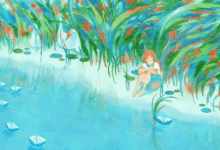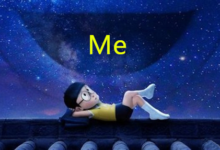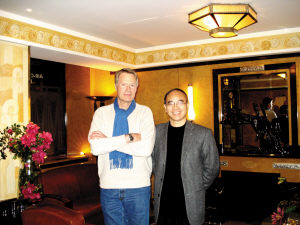A World Apart
I pulled the old, knotted, pine door and peeped inside, squinting my eyes to see through the floating dust and clutter of the villa’s main entranceway. Tiny rays of dawn filtered through the lacy Victorian curtains, throwing giant shadows of figurines and statues, on the gilded ornate wallpaper. The old and rundown appearance of my childhood summer getaway piqued my curiosity and guided me into the main reception area, where I remembered playing as a child.
The large hall widened, at the far end, into what appeared to be the dining area. White throw-cloths, carefully placed by the last owners, covered what was left of the more elaborate carved, oak furniture. Adorning the old, decorative ceiling, hung the multi-crystalloid chandelier, still hinting at the glamour and tasteful elegance, probably enjoyed by many of the well-to-do elite, living along the Camden/Rockport coast of Maine.
Through the large, bay-window, I watched the waves break powerfully against the irregularly-placed jetty stones, displaying the proud and dominant North Atlantic, in all its white foamed fury. It was high tide. Glancing back at the large dining-table, fully capable of seating at least 30 “politically correct” guests, I imagined what a magnificent view diners must have enjoyed, while feasting on lobsters and other seafood delicacies. Surely they were not adorned with the traditional tourist “lobster bibs” I thought, unable to refrain from the image, but then again, perhaps they were. It was a thought I quite enjoyed having.
The house stood silent and hidden, atop the coastal ledges and rocks of Belfast, Maine. Although unpopular with the locals, the granite house was built in 1831 by the famous seafaring Captain Gordon Albright for his wife, Sarah, who undoubtedly, like many women of her day, watched the horizon from the widow’s peak for her lover’s return. Contained in the historic records are documents written by the Captain himself, describing the pain and torment of his return to Belfast, only to discover his family dead, victims of an outbreak of cholera among the coastal settlers. Stricken with grief and despair over the loss of his beloved Sarah, the proud Captain Albright hung himself from the old barn’s rafters, and was buried by the ship’s company, in the small family cemetery near his wife and their two young boys.
Continuing on my journey, I found myself mindlessly climbing, step-by-step, up the narrow passage to the widow’s peak, overlooking the ocean. What a magnificent view of the majesty and partnership of water and land! The old, caned, high-back rocking chair still stood by the window, suggesting the wait might have been long and enduring. The view across the blue-green ocean crests quieted my spirit for a moment, as I reflected upon the significance of the room, and the dedicated love brought to it by Sarah Albright. Qualities such as patience and loyalty came to mind, as I saw her in my deepest imagination, sitting quietly, her shawl pulled tightly around her delicate shoulders; only a tiny flame of a whale-oil light to offer her husband, as a guide to a place of safety and home. In good while, the long awaited Captain Albright, searching the rocky coast with his binoculars, eventually found the tiny flickering light, in which he recognized the quiet beauty of his wife’s face, and turned his ship’s bow toward it.
As the evening sky turned red with cool sunset hues, and the ocean settled calmly for the night, I seated myself comfortably into the high-back rocker and lit the old kerosene light, still filled with oil: cedar, I think. The breaking waves grew peaceful now, gently rolling into shore, unaware of my guardian vigil. I placed my hands on the steel barrel of the pistol sitting idle on my lap, and reassuringly felt the coldness of the metal beneath my fingers. Closing my eyes, I thought about 1968, and, as the whirling sounds of helicopters grew louder and louder, I drifted further and further away, to memories of an unfamiliar land of war and death. Vietnam smells like no other country in the world! Odors of frying fish and rice, spices, and cow manure quickly reminded me that I was no longer in my safe home in Maine, but in a world very different from my own. It occurred to me, at the time, that people back in the world would probably describe Vietnam as beautiful, but I never thought so.
Tall green, wheat-like grasses bordered Tan Son Nhut airfield, first blowing forward in the humid air, then backward again, giving the illusion of subtle wave-like movement. Vietnamese workers, in the field, barely looked in our direction. It was a day like any other for them, I supposed, but for me, it wasn’t the same at all. I was an Army nurse, sent to Vietnam in wartime and that made it significantly different. After landing, one of the young airmen kicked my duffel bag off the chopper, sending it flying just short of my feet.
“Hey, thanks, buddy!” I shouted upward, to no one in particular, engulfed for a moment by a whirlwind of dust, stirred up as the chopper took off again. I had not been in Vietnam for one hour and I hated it already!
“Are you Lieutenant Pennet?” A young private called from behind me, startling me for a moment with a quick, but lazy salute. I returned the gesture and nodded.
“This way Mame.”
Although my orders originally assigned me to Saigon, the driver informed me that I had been reassigned to a medical triage unit in Da Nang, and handed me my new orders in a large manila envelope. There was no need to open it. What I really wanted, and needed, was rest, but the unexpected ride to Da Nang kept me alert, whether my body wanted to or not. The miles clicked away as one muddy rice-paddy after another passed, and still, not one human being, or beast of burden for that matter, turned in our direction. For a moment, I imagined I was looking at a picture, painted in oils of greens and bronze, a still-life on a canvas, casting surreal images to any passer-by. Elf-like figures wearing concave, grass hats appeared statuesque, and pasted into the scenery, not real-not human. You’re being silly, I reminded myself, but around each bend in the road, the painted picture of my new world always seemed the same.
As the jeep, and my restless ride, came abruptly to an unexpected halt, I realized just how here-and-now my future really was.
Whirling sounds of aircraft thundered over me, making it difficult to discern any reliable source of activity. A male voice shouted from somewhere: “Get that soldier over here!” Another voice simply said: “This one’s dead, bag ’em!”
Shadows of Corpsmen pushed cots and stretchers into unseen places, creating the uncanny impression of organized chaos. As the sand finally settled, I was able to make out the sign nearest me. Painted in large red letters it read: “VD Hut.”
“Good Lord,” I mumbled, quickly dismounting the vehicle with my gear.
“Can you tell me where Captain Collins is?” I asked the driver, who had lit himself a Marlboro, from a crumpled pack of cigarettes taken from his pocket.
“That’s him over there, Madame.” He said, pointing to a dark-haired man in a white coat. I looked in his direction, and for a brief moment I found myself unable to move my feet. It was then I saw, and smelled the blood. As a medically-trained nurse, and a professional, I was used to the sight of blood. It’s just, that there was so much of it. Soldiers laying on cots were not only covered with deep purple red bandages, but pools of oozing liquid, from missing appendages, dripped to the dirt floor and formed puddles, eventually tracked here and there by the throngs of medical corpsmen, and nurses, running about. The tent smelled like death! White lab-coats, streaked with red, walked everywhere; like robots, unaware of the amount of death they carried upon them.
恍如隔世
我拉开那扇旧的松木门,还能感受到粗糙的树疤痕,斜着眼睛往里看。我看到的是漂浮在空中的尘埃, 和别墅门廊里的凌乱摆设。几缕早晨的阳光透过花边的维多利亚式窗帘射进来, 在那镀金的墙纸上留下雕像长长的影子。我还记得小时候的夏天我就是从这里逃出去玩的,可现在却衰败如斯!!好奇心驱使着我继续往前走,到了客厅,小时候在这里玩耍的情景仍然历历在目。
客厅被加宽了,在靠饭厅的那头加宽了。上届的屋主还很用心地用白布把那些做工巧究的橡木家具盖好。在华丽的天花板上挂着一盏多层的水晶枝状吊灯,依然是那么优雅漂亮。它曾经被许多的社会名流们交口称赞,可现在它在缅因海岸的康登/岩石港上形影孤单。
透过巨大的凸窗,我可以看到海浪正在有力的摔打着防洪堤上那些参差不齐的石头,被它掀起的白色泡沫仿佛在向人们述说北大西洋的骄傲和强大。海水正在涨潮呢!我回过头看了看那张巨大的餐桌,大得完全可以容纳下30位“政治清白”的客人。我想当这些来宾们在享用龙虾和其他海产美味时,他们一定也可以同时欣赏到窗外壮观的场面。当然了,这些来宾们在吃龙虾大餐时是没有系传统围兜的了,可我老是想着这些来宾们系围兜的样子,或者他们真的系上了呢!我饶有兴趣地想着这个问题。
这个别墅静静的屹立在缅因州贝尔法斯特海岸的暗礁与岩石上面,在当地人中并不出名。但这座花岗石别墅的缔造者却很有名,它是航海界名人戈登?阿尔布莱特船长于1831年为他的爱妻莎拉建造的。毫无疑问,莎拉和她同时代的女人一样,会在寡妇峰上翘首期望丈夫的平安归来。从历史记载中发现有船长自己写的记录,他描述了自己在回贝尔法斯特路途中遇到的种种艰难险阻。可当他回到家时却发现家人都在海岸居民中流行的一次霍乱中死去。伤心欲绝之下,骄傲的戈登?阿尔布莱特船长在旧谷仓的椽子上上吊自杀。水手们就把他和他的妻子、两个儿子埋葬在一起。
我继续漫无目的地攀爬着,一步一步沿着狭窄的过道上了寡妇峰的山顶。俯瞰脚下的大海,这是多么壮丽的景色啊,山和水完美地结合在了一 起! 那张古老的藤制高背摇椅仍然靠立在窗口,仿佛在告诉人们这是一个多么漫长而痛苦的等待。看着远处那蓝绿色的浪涛,我的心灵出奇的宁静。我想着这屋的意义,想着莎拉?阿尔布莱特为这屋付出的爱,她是多么的坚韧和忠贞!我眼前仿佛浮现出她的样子。她在安静地坐着,娇弱的肩上紧紧地裹着一幅围巾。屋里只点着一盏鲸油灯,微弱的灯光就是照着丈夫安全回家的导航灯。过了好一会,莎拉苦苦等待的阿尔布莱特船长终于出现了,他用望远镜探视前方,终于在怪石嶙峋的海岸上发现了一丝闪烁着的微光,他还看见了妻子那恬静的脸庞。于是他立刻下令朝这个方向进发。
夜色降临,夕阳把天空染成了红色,大海也渐渐平静了下来。我很自在地坐在高背摇椅上,点燃了那盏旧煤油灯。灯盏里还有油,我猜是香柏油。那桀骜不逊的海浪也慢慢恢复了平静,浪花温柔地卷上岸来,一点也不知道我在守护着他们。我把玩起放在大腿上的手枪,摸着那钢制的枪膛,手指一阵冰凉。闭上眼睛,我想起了1968年,耳边也仿佛传来直升飞机螺旋桨的声音。声音变得越来越响,我的思绪也越走越远,回到了那片充满了战争和死亡的陌生土地上。越南的味道和世界上其他任何国家的味道都不同! 夹杂着油炸鱼和大米的香味、辣椒、还有牛粪的味道。这一切都提醒着我,我再也不是在我缅因安全的家里了,而是到了一块完全不同的地方。当时,还在家里的人们都说越南是个美丽的地方可我却从来没有这样想过。
唐山冲机场周围长满了高高的象小麦一样的杂草,在潮湿的空气中先是往前倒,然后又往后倒,就像海浪一般。在田里劳作的越南工人连头也没有抬起来看我们一眼。我想,对他们来说,这只不过是平凡的又一天而已。但对我来说就显得意义非凡。我是个随军护士,在战争时期被派遣到了越南。刚降落就有一位年轻的飞行员把我的背囊一脚踢了出来,刚好掉在我的脚边。
嘿,谢了,伙计!”我朝上面喊了一句,并没有针对任何一个人。飞机很快重新起飞,螺旋桨卷起的灰尘一下子就把我给笼罩住了。我到越南还不到一个小时我就已经讨厌它了!
“你是彭妮特中尉吗?”一个年轻的下士在我背后喊了一声,还很快给我敬了一个随随便便的军礼,把我吓了一跳。我回了个礼并点了点头。
“这边请。”
我原来的任务是到西贡去报到,可司机通知我说我被重新任命到一个在岘港的医疗救护点,并递给我一个用马尼拉麻纸信封装着的任命书。我根本就不想打开它,我满脑子想的就是要休息。但是这意料之外的岘港之行却让我一路保持警惕,不管我的身体怎么想。我们驶过一个挨一个的水稻田。可是一路上我们都没有见到其他任何人,或是其他驮载着东西的动物。这时候我认为我是在看着一幅画,一幅以绿色和青铜色为主色的油画,一幅帆布上的静物图,为路人展现着超现实流派的映象。图画上有一群精灵一样的人,戴着凹进去的草帽,看上去很庄严,可脸很模糊。“你又在瞎想了,”我提醒自己说。可尽管汽车在路上转过了一个又一个的弯,展现在我面前的图画和就如同画好的图像一样一成不变。
当我以为会这样一路行驶下去时,吉普车突然停了下来,我才意识到决定我命运的地方到了。
头顶上的飞机在轰隆隆作响,我根本不知道人们在干什么。远处传来一个男子的怒骂声“把那个士兵叫过来!” 另外一个声音简单的回答说“他已经死了,把他们包起来!”
医药兵们忙碌地扛着担架冲到远处的一个地方,形成了一个怪异的情景,一个有组织的混乱情景。当尘沙慢慢落定时,我才看清离我最近的一个标志。上面用大红字母写着:“VD 临时军营”。
“天啊,”我咕哝着,迅速拿着装备从车上跳了下来。
“能告诉我柯林斯上尉在哪吗?”我向那个司机问道。他正从自己的口袋中拿出一包皱巴巴的香烟,给自己点了一根万宝路。
“他在那边呢” 他指着一个黑头发白外衣的人说。我朝着他所指的方向看过去,一时间我楞在了那时,我觉得自己的脚都动不了。我看到的、闻到的都是鲜血。作为一个受过专业医疗训练的护士,我早对鲜血见怪不怪了。可是我从没见过这么多的鲜血。那些躺在担架上的士兵身上包扎着的绷带被染成了深紫红色,鲜血还不断地从伤口处渗出来,滴在地面上,形成了一个个的血坑,被来来去去的医生和护士们践踏着,在地面上留下斑斑血迹,营救营里充斥着死亡的气息!身穿手术衣的人衣服上溅满了鲜血,在四处乱走,如同机器人一般,根本不在乎他们究竟抬过多少死人。














